| Srl | Item |
| 1 |
ID:
138407
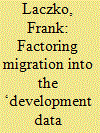

|
|
|
|
|
| Summary/Abstract |
Migration stories appear in the news around the world nearly every day. Migration is one of the most hotly debated policy issues and has grown in importance on the global agenda of the United Nations (UN). But how much do we really know about migration and the impact of migration policies and programs? Do we have the data to make a strong case for the inclusion of migration in the post-2015 development agenda? This article takes a hard look at the migration evidence base and outlines a set of recommendations to achieve a “migration data revolution” over the next decade. The article is written from a global perspective, and discusses data on both regular and irregular migration. It also considers how data are shared and used by policymakers, and why there is so little data on the impact of migration programs.
|
|
|
|
|
|
|
|
|
|
|
|
|
|
|
|
| 2 |
ID:
167127
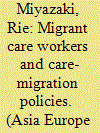

|
|
|
|
|
| Summary/Abstract |
Japan and Italy are the most aging societies in the developed countries and they both face the rapid increase of the social cost and the demand in manpower for long-term care. Both countries have the common welfare state trajectories and characteristics. In contrast, both the care and migration policies and the role of migrant care workers between Italy and Japan are consistently different. The paper compares the welfare state characteristics, care configurations, and the care-migration policies in 2000s, and reveals how the role of migrant care workers in Italy and Japan would be influenced by the migrant and care policies reciprocally. The paper concludes that the combination of the restricted migrant policies for unskilled migrant care workers and the in-kind-based national care policies is significant in efforts to maintain a qualified and regulated care work. Conversely, it verifies that the in-cash-based national care policy with the weak migration control for unskilled migrant workers brings the spread of marketized care with weak control and low professional skills, mostly in the gray market.
|
|
|
|
|
|
|
|
|
|
|
|
|
|
|
|
| 3 |
ID:
126458
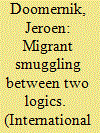

|
|
|
|
|
| Publication |
2013.
|
| Summary/Abstract |
Migration processes are driven by forces that are by their very nature difficult to address with government policies, especially when these are aimed at control and restriction. Yet, in response to domestic and international policies, governments, jointly and individually, seek to intervene forcefully in certain types of migration. Paradoxically, these interventions by and large go against the logic inherent in migration processes and thus have perverse effects: they do little to reduce migration and instead create a market for human smuggling. The thrust of current policy development is in the direction of further criminalisation. It is argued that this is not the most sensible course of action.
|
|
|
|
|
|
|
|
|
|
|
|
|
|
|
|
| 4 |
ID:
110509
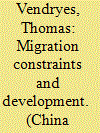

|
|
|
|
|
| Publication |
2011.
|
| Summary/Abstract |
Rural-urban migration flows are a crucial corollary of economic development. The adverse or beneficial effects of internal migration, for sending as well as receiving areas, and the definition of optimal migration policies, have remained much discussed issues since the seminal works of Harris and Todaro (1970). This debate is especially acute in China where the "household registration system" (hukou) acts as a strong constraint on individual migration. This paper aims to assess the consequences of hukou through a simple model of a developing dual economy with overlapping generations. Contrary to existing studies focused on the contemporaneous allocation of economic resources, it deals with the dynamic consequences of migration flows and migration policies. It shows that, in fairly general circumstances, hukou-related migration constraints can actually hasten development, understood as the transfer of the labor force to the modern sector, driven by capital accumulation. The hukou system could thus be one of the causes of the extremely high Chinese saving rate and of the high pace of Chinese development. Insights from the model are confronted with stylized facts from the Chinese development, and theoretical results are especially consistent with the effects of the 2001 "towns and small cities" reform.
|
|
|
|
|
|
|
|
|
|
|
|
|
|
|
|
| 5 |
ID:
132337
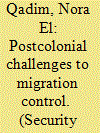

|
|
|
|
|
| Publication |
2014.
|
| Summary/Abstract |
Analyses that develop a postcolonial critique of international relations and security studies have outlined the project of 'decolonizing' these disciplines and have underlined the importance of taking into account actors from the South. I seek to do so here through the study of migration policies, in particular by looking for the agency of state actors in so-called countries of origin. This article shows that the study of practices of cooperation is a good strategy for decolonizing the study of international relations. Based upon the example of mid-level cooperation on deportation between France and Morocco, this article focuses on two devices and the practices used for international cooperation on migration controls: the posting of immigration liaison officers and the statistical evaluation of cooperation. This case study shows that such practices open brokering spaces in the transnational security field and allow state actors from the South to challenge the dominance of the North.
|
|
|
|
|
|
|
|
|
|
|
|
|
|
|
|
| 6 |
ID:
136301
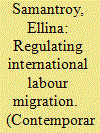

|
|
|
|
|
| Summary/Abstract |
Regulating international labour migration has been at the core of policy concerns in many countries of the world. The increasing movement of people from countries of origin to destination for employment has led to corresponding issues of trafficking of women, exploitation by recruitment agencies and violation of migrant rights. In this context, this present paper explores the problems of migrant workers exploited through recruitment agencies and the nature of exploitation and atrocities perpetrated on them. It also tries to understand the role of migration policies and migration management and regulation. Overall, the paper contextualizes international migration and the role played by recruitment agencies vis-à-vis Private Employment Agencies Convention 1997 (No. 181) adopted by the International Labour Organization.
|
|
|
|
|
|
|
|
|
|
|
|
|
|
|
|
| 7 |
ID:
182409
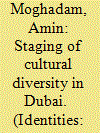

|
|
|
|
|
| Summary/Abstract |
This paper will argue that the pursuit of the UAE’s nation-state-building project, the implementation of neoliberal urban policies, and increasing security concerns together have led to the Dubai authorities projecting a selective, discretionary representation of diversity. Based on ethnographic accounts of the Dubai Art Fair in the city’s new urban spaces, the article aims to offer insights into the politics of cultural diversity in Dubai today.
|
|
|
|
|
|
|
|
|
|
|
|
|
|
|
|
| 8 |
ID:
176475
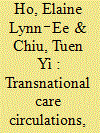

|
|
|
|
|
| Summary/Abstract |
Contrary to the perception that older adults are passive care dependents of their children, some Chinese older adults are becoming primary caregivers in migrant families. Using the case of Chinese older migrants who move temporarily to Singapore for grandparenting duties, this article examines the grandparenting migrants’ contributions to social reproduction through transnational care circulation and underscores how their migratory experience changes their perspectives of intergenerational familial contract. While previous studies on older migrants tend to consider the impacts of welfare support in the migrant‐receiving context, we extend that body of work by integrating analyses of the private sphere with the public sphere across the migrant‐sending and ‐receiving contexts to examine how transformations in both domains impact the grandparenting migrants’ ageing subjectivities. Our findings reveal gradual changes to the intergenerational familial contract in Chinese migrant families. The grandparenting migrants minimise their expectations of intergenerational reciprocity and instead emphasise the well‐being of the next generation and maintaining their autonomy in later life. Their aspiration for independent ageing, we argue, is made possible by the expanded state social protection in the homeland and the realisation that depending on their migrant children for old age care could be impractical and unfavourable for both generations
|
|
|
|
|
|
|
|
|
|
|
|
|
|
|
|